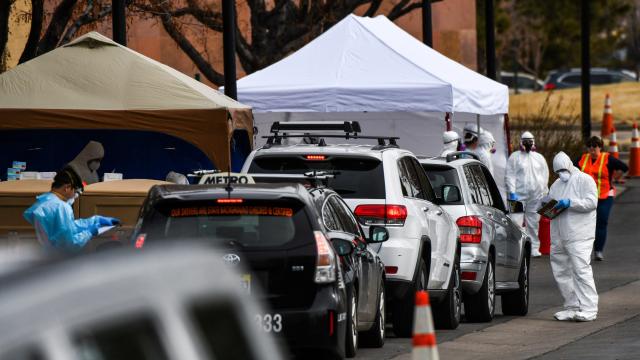Over the past 24 hours, health officials in Colorado have reported finding two suspected cases of covid-19 caused by a worrying new variant of the coronavirus. The variant, first detected in the UK, is strongly believed to be more transmissible than previous strains, though recent data has also suggested that it’s not more likely to cause severe illness or death. Still, experts are worried that the variant is already spreading in Colorado and elsewhere in the country.
The first case was reported Tuesday night, while the second was reported Wednesday morning. Both involve men who worked at the Good Samaritan Society assisted living facility in Elbert County, but neither live in the area, according to CNN. Officials with the Colorado Department of Public Health and Environment are now looking into the cases.
[referenced id=”1659928″ url=”https://gizmodo.com.au/2020/12/what-we-know-about-the-new-coronavirus-mutations-and-the-vaccines/” thumb=”https://gizmodo.com.au/wp-content/uploads/2020/12/22/b97vlgyiyhtho0vxm9au-300×169.jpg” title=”What We Know About the New Coronavirus Mutations and the Vaccines” excerpt=”Scientists in the UK and elsewhere are reporting the discovery of new, potentially important mutations found in local strains of the coronavirus. These mutations may pose a real added danger to people, with early research suggesting that these variants are more transmissible than the classic version. And though there’s much…”]
The variant — known either as B.1.1.7 or VOC 201212/01 — was first detected in the UK this September through the routine genetic surveillance of virus samples collected from patients. But it wasn’t until early December that scientists grew alarmed, when newly infected cases in southeast England began to increasingly carry the variant. That suggested that this strain was better at infecting people. Since then, more countries have reported finding strains of the coronavirus similar to B.1.1.7. Around the same time, scientists in South Africa found another variant that may have independently evolved to carry some of the same mutations found in B.1.1.7. This variant is also suspected to be more transmissible and has been detected in other countries, including Japan.
At this point, there are still more questions than answers. Many scientists have grown confident that B.1.1.7. and similar strains are more transmissible (possibly up to 70% more) than other existing strains of the coronavirus, thanks to multiple mutations that are changing or deleting some of its genetic code. These mutations could potentially affect how the virus will respond to already-developed treatments or vaccines, at least partially, but experts are not yet sure if that’s the case. At least one preliminary study this week has shown, however, that mutations created in the lab similar to those seen in these variants could theoretically help the virus evade antibodies taken from people who caught the coronavirus early on in the pandemic.
On the more reassuring side, it’s unlikely that B.1.1.7 is proving more deadly for those unlucky to catch it. Recent data from the UK has found no connection between these cases and an increased risk of hospitalisation or death, compared to covid-19 patients not infected by the variant. Early data so far doesn’t suggest that children are more susceptible to infection from the variant, as some experts had initially worried.
Still, a more infectious variant circulating widely in the population could very well lead to more hospitalizations and deaths, if only because more people end up contracting covid-19 as a result. Right now, there’s really no telling how prevalent this variant is in the U.S. The country simply isn’t conducting as much genetic surveillance of the virus as other nations, possibly explaining why it took as long as it did for these cases to be found. The first case also had no recent travel history, according to Colorado health officials, meaning that the person caught it from the community at large.
Ultimately, B.1.1.7 doesn’t appear to be a radically different threat than the coronavirus we’ve grown to know and hate. It still spreads through contact with the droplets, aerosols, and bodily gunk of infected people. You’re still more likely to contract covid-19 by spending time indoors around crowds of people, especially if you and others are not wearing a mask. And avoiding those situations as much as possible and otherwise minimising your risk will still lower the odds of catching the virus.
Unfortunately, the U.S. is in the grips of a widely uncontrolled pandemic, and many people are letting down their guard and travelling. Daily reported cases, hospitalizations, and deaths continue to be high, though the holidays have complicated data collection efforts. While we now have two available vaccines for covid-19, the actual rollout has been disastrously slow so far. As of early December 30, only 2.32 million Americans are thought to have been given a first dose of a vaccine (both Pfizer and Moderna’s vaccines require two doses) — far below the roughly 40 million doses that were supposed to be available by the end of the year.
The new year remains likely to usher in the beginning of the end of the covid-19 pandemic. But it’s looking like the coronavirus won’t give up without one hell of a fight.
